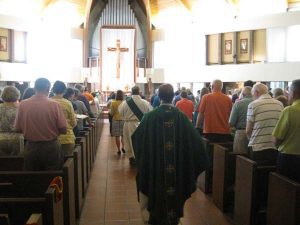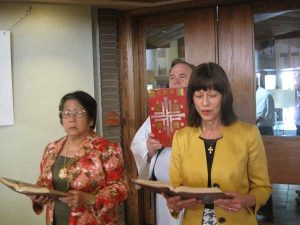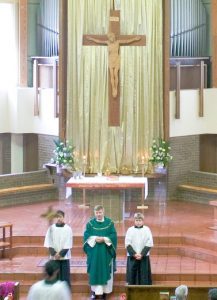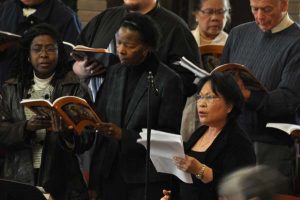Liturgical Ministers
“Serving the Church since 33 AD”
Overview
Overview
 All Liturgical celebrations, especially the celebration of the Eucharistic Liturgy, are celebrations of the whole Church. They are not private functions. The Church is the “sacrament of unity: the holy people united and arranged under their bishops. Therefore, liturgical services pertain to the whole Body of the Church”. (CSL 26)
All Liturgical celebrations, especially the celebration of the Eucharistic Liturgy, are celebrations of the whole Church. They are not private functions. The Church is the “sacrament of unity: the holy people united and arranged under their bishops. Therefore, liturgical services pertain to the whole Body of the Church”. (CSL 26)
In the midst of this Body, there are individual ministries who serve all the faithful by executing different functions. These functions are integral and necessary parts for the liturgy to be performed in a dignified and reverend manner, and for respecting the nature, shape, and dynamic of liturgy. These ministries may include:
- Priest (Main Celebrant)
- Deacon
- Altar Servers
- Extraordinary Ministers of Holy Communion
- Lectors
- Ushers
- Music Ministers (choir/cantor)
The Priest & Deacon are ordained ministers; the Priest is the single indispensable minister for the celebration of the Holy Eucharist. Fr. John wrote about this in the Faith Focus section of this bulletin. The Deacon, when present, has specific functions pertaining to his role in the celebration, and these must be observed.
Lay Liturgical Ministers exercise a “genuine liturgical function. They ought, therefore, to perform their roles with the sincere piety and decorum demanded by so exalted ministries and rightly expected of them by God’s people” (CSL 29).
All liturgical ministers exist for the service of the Body of Christ, the People of God, the assembly gathered in God’s name. Although serving in any of these ministries should be a source of joy and satisfaction for individual people, these ministries exist for the benefit and service of the Church and not for individual or personal piety, spiritual growth, or status. As such, these ministries are regulated by Church and Liturgical law and are submitted to the authority of the Bishop and the local Pastor (USCCB).
At Holy Faith Catholic Church, these liturgical ministries strive to be modeled after the example of service of Jesus Christ in the Washing of the Disciple’s feet at the Last Supper. (John 13: 1-15). Serving at the Liturgy is an act of self-giving, not self-seeking; an act of love that must be continued in the ordinary of our lives for the glory of God. Therefore, “The faithful should not refuse to serve the People of God in gladness whenever they are asked to perform some particular service or function in the liturgical celebration.” (GIRM 97)
Becoming a Minister?
How do I become a Liturgical Minister?
You may be asked or you may volunteer to become a Liturgical Minister if you feel the call from the Lord and/or the community. Fill out a Liturgical Minister Profile form or pick up a paper (pink) form in the church office or the vestibule of the church and return it to the church office. Someone will contact you as soon as possible. We are in need of all forms of ministers at all the Masses. The Pastor has the final approval of all liturgical ministers before they can begin service at the Mass.
Am I Qualified?
How do I know if I am qualified for a specific ministry?
We will help assess your skills and gifts and will guide you to the best ministry for you to serve. Our guide will always be “… everything should be done for building up” (1 Corinthians 26). The following are some guidelines that can be helpful:
Ushers
Requires people-oriented individuals (both men & women) with the ability and willingness to anticipate and serve the needs of others, and to perform tasks during the liturgy with reverence.
Tasks
Ushers welcome people at the doors of the church. They take up the offering (collection) and may present the gifts of bread and wine. People in this ministry are expected to arrive at Mass at least20 minutes prior to the beginning of the Liturgy.
Lectors
 Lectors require the ability to read publically the Sacred Scripture in various literary forms in a clear and articulate voice. Initial screening is done at training sessions. Those who do not have the skill to properly execute this ministry will be directed and welcome to serve in one of the other ministries. Ongoing formation and assistance will be provided for those who may need additional help.
Lectors require the ability to read publically the Sacred Scripture in various literary forms in a clear and articulate voice. Initial screening is done at training sessions. Those who do not have the skill to properly execute this ministry will be directed and welcome to serve in one of the other ministries. Ongoing formation and assistance will be provided for those who may need additional help.
Tasks
Lectors proclaim the “Word of God” at Mass. They are expected to spend time in preparation each time they proclaim the Word. They often will also pray the General Intercessions at Mass.
Altar Servers

Adults and Young (9 years old and above), male and female are welcome. Must be confortable wearing an alb and being in front of large crowds with reverence. Must be able to follow directions and perform regular liturgical functions and procedures without calling attention to one’s self.
Tasks
Altar Servers assist the priest at the altar during the liturgy and facilitate ritual activity and movement during the liturgical celebration.
Extraordinary Ministers of Holy Communion (EMHC)
 Must be at least 18 years of age. Both men and women are welcome. Requires the physical ability to maneuver liturgical vessels with reverence and dignity and the ability to observe a reverent and prayerful attitude while being comfortable handling the sacred species. This ministry is greatly enhanced by the minister’s concern and care for the poor, the hungry, and the needy. They are “extraordinary” because the “ordinary” minister of Holy Communion is the ordained minister.
Must be at least 18 years of age. Both men and women are welcome. Requires the physical ability to maneuver liturgical vessels with reverence and dignity and the ability to observe a reverent and prayerful attitude while being comfortable handling the sacred species. This ministry is greatly enhanced by the minister’s concern and care for the poor, the hungry, and the needy. They are “extraordinary” because the “ordinary” minister of Holy Communion is the ordained minister.
Tasks
EMHC assist with the distribution of the Body and Blood at Masses. They may also take communion to the sick and homebound if they are interested in this ministry.
Music Ministers
 Music for our liturgical celebrations is arranged and prepared through our Music Ministry Program. Those interested can contact our Music Director, Cristina Logan. We provide the musical training necessary for this ministry: no prior special training is required but skilled trained individuals are welcome and encourage to participate. More information about Adult and Children’s Choir is available at the Music Ministry.
Music for our liturgical celebrations is arranged and prepared through our Music Ministry Program. Those interested can contact our Music Director, Cristina Logan. We provide the musical training necessary for this ministry: no prior special training is required but skilled trained individuals are welcome and encourage to participate. More information about Adult and Children’s Choir is available at the Music Ministry.
Tasks
Music Ministers facilitate singing at all our Sunday liturgies, sacramental celebrations, and rites or the Church, as well as special events throughout the year. We need singers, cantors, and instrumentalist.
Training & Formation
Training & Formation
Formation and training is required by Diocesan and Local norms for all who are interested in Liturgical Ministry even if you have been trained in another parish or diocese and have experience in liturgical service.
Training varies from parish to parish in the Diocese of St. Augustine, and may vary from ministry to ministry.
At Holy Faith Catholic Church all interested ministers are required to attend a two-hour General Session followed by practical training for individual ministries. The practical training will vary according to ministry. The General Sessions are offered as need arises, generally twice a year. On special occasions, we may begin formation with practical training, following at a later date the attendance at one of the General Sessions (this General Session is required for continuing in the ministry).
Prayers & Resources
Prayers & Resources
- Living the Mass: How One Hour a Week Change Your Life
by Domminic Grassi & Joe Paprocki - Preparing for Liturgy: A Theology and Spirituality
by Austin Fleming - Celebrating the Eucharist: A Practical Ceremonial Guide for Clergy and Other Liturgical Ministers
by Patrick Malloy
